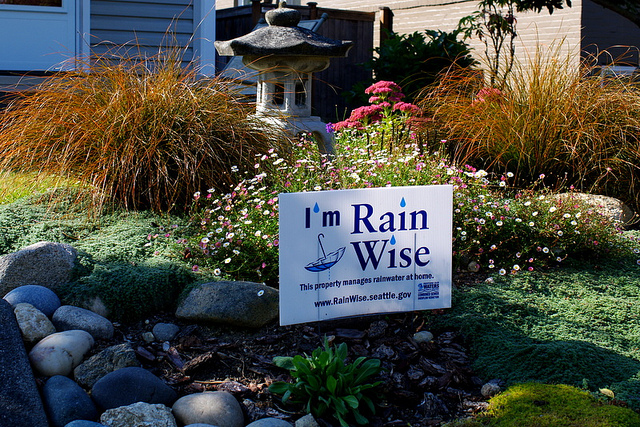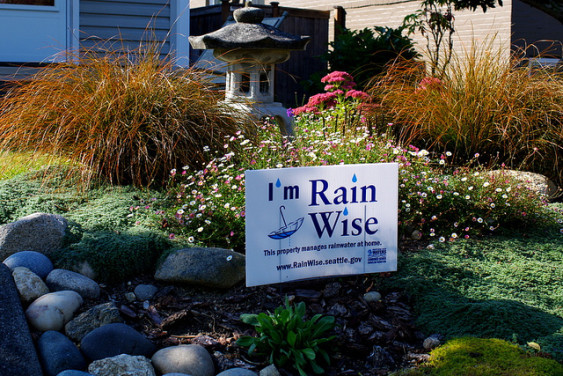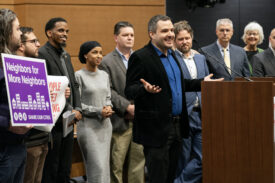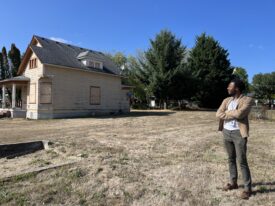Seattle’s RainWise rain garden program is spreading green stormwater solutions across the city, but the rebate program has been out of reach for some homeowners with more modest incomes. While RainWise offers generous reimbursements—$4,600 on average for the installation of rain gardens and cisterns—the homeowner has to pay for the work upfront, then wait up to two months for the program to pay them back. It’s an expense that not everyone can shoulder.
A new financial program called the Green Infrastructure Rebate Advance Fund (GIRAF) should remove that hurdle by bridging the payment gap. A separate access fund will also provide small grants to partially pay for projects near the Duwamish River that cost more than the city’s rebate.
RainWise “is definitely an exciting success story,” said Aaron Clark, the driving force behind GIRAF and program manager for the non-profit Stewardship Partners. Now GIRAF will put RainWise rebates in reach of even more residents.
RainWise is a joint program of Seattle Public Utilities and King County Wastewater Treatment Division. Participants setting up the new funding sources include Stewardship Partners, which leads the 12,000 Rain Gardens program, an effort to expand rain garden installations throughout the Puget Sound basin; Craft3, a nonprofit financial institution; and Natural Resources Defense Council (NRDC), which helped provide financial and other advice to get the project launched.
While the project is starting as pilot, GIRAF proponents hope the revolving fund for green infrastructure could expand regionally and beyond.

Seattle rain garden image by Lisa Stiffler
“We have been excited from the beginning to be involved with this project,” said Alisa Valderrama, a San Fransisco-based senior project finance attorney for NRDC.
The way the revolving fund works is that Craft3 gives the contractor an advance of half of the rebate for the project. Once the work is done and inspected, the contractor collects the other half. Then when the city issues the rebate for the work, it goes directly to the bank.
The King Conservation District provided a $40,000 grant to supply the capital to get GIRAF going, as well as to pay for development, management, and outreach for the program. The grant will also cover the contractors’ enrollment fees for the first year of the program. To further entice contractors to participate, GIRAF won’t charge them any interest the first time they use the fund. After that, contractors will be charged interest, but at a below-market rate, and because the rebates are paid within two months, the fees should be minimal.
Before the creation of GIRAF, some contractors were trying to front homeowners the installation costs themselves, but it didn’t work very well. “There are so many little mom and pop [contractors],” Clark said. “Because they’re so small, they’re susceptible and at risk.”
RainWise started in 2010 and has helped pay for more than 600 green stormwater projects in select Seattle neighborhoods. The program’s goal is to stop combined sewer overflows (CSOs) in which sewage waste and polluted stormwater runoff spill untreated into Puget Sound and other waterways during heavy rainstorms.
“RainWise has spent $2.5 million on rebates for installations that can control more than 9 million gallons of stormwater.”
The US Environmental Protection Agency and the Seattle and King County governments have an agreement to curb the spills, and installing green infrastructure is one of the cheapest ways to do so. RainWise has spent $2.5 million on rebates for installations that can control more than 9 million gallons of stormwater. Other CSO projects include the construction of traditional detention facilities, pipe retrofits, and building souped-up rain gardens called “bioretention facilities” on public property along roadways.
RainWise funding is only available in neighborhoods with an overflow problem, but it turns out these aging systems that comingle stormwater and sewage waste were installed across the city decades ago. So RainWise is available throughout most of north Seattle, near Lake Union, along the western shores of Lake Washington, in patches of west Seattle, and near the Duwamish River.
Other cities and counties in Western Washington and around the US have green stormwater infrastructure rebate programs. Locally, Bellingham, Everett, Shoreline, and Tacoma have some of the highest reimbursement rates.

RainWise rain garden image by Lisa Stiffler
The RainWise rebate is determined by the size of the roof that’s being treated and the treatment capacity of the rain garden or cistern. That ensures that the investment of taxpayer dollars corresponds to a specific public benefit. The more polluted runoff that’s controlled onsite, the less stormwater is being funneled into city infrastructure. If a RainWise project costs more than the calculated public benefit—perhaps it’s a tricky installation, or a homeowner wants certain plants or other features—the city won’t cover those additional costs.
Stewardship Partners created another fund with a $35,000 grant from King County Wastewater Treatment Division’s Green Grant program. These dollars will help pay for projects that come in above the city rebate through grants of up to 10 percent of the city’s refund. The money is earmarked for lower-income homeowners in south Seattle’s lower Duwamish watershed. GIRAF loans are available to everyone.
The NRDC’s Valderrama applauds Seattle for its creative solutions for capturing and treating stormwater. “Many cities have very cost-effective stormwater management opportunities on private land—though accessing those opportunities requires a willingness to try something new,” she said by email. “Seattle is one of a handful of cities that is implementing bold green infrastructure incentive programs targeting private property.”
Residents and contractors interested in applying for GIRAF dollars should contact Craft3’s Adam Zimmerman at 888-231-2170. Those seeking financial help to pay for additional costs for projects in the lower Duwamish watershed should contact Aaron Clark at Stewardship Partners at ac@stewardshippartners.org or 206-292-9875.










Debbie Smith
Thank you for your continued excellent coverage of stormwater issues.
Eric Thomas
Thanks for explaining the GIRAF. Lots of useful information here!